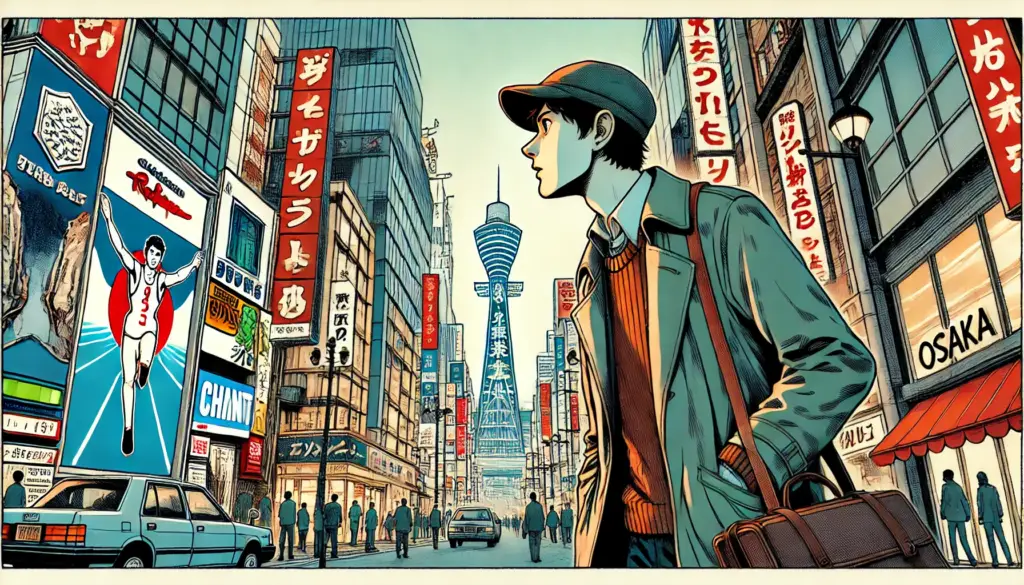
When people in Japan jokingly say, “Osaka is not Japan,” they are not denying geography but pointing to something deeper. Osaka has long been seen as a place with its own culture, politics, humor, and social norms that often stand apart from the rest of the country. This sense of difference is so strong that even many Japanese themselves sometimes treat Osaka as a “nation within a nation.” But what makes Osaka so distinct?
In this article, we will explore the unique cultural identity of Osaka: its political climate, its rich comedy tradition, and the way people interact with one another. We will also ask why Osaka’s quirks are often embraced as comedic material rather than seen as offensive.
A Merchant City with a Different Historical Background
Unlike Tokyo, which was built as the seat of political power, Osaka developed primarily as Japan’s merchant capital. During the Edo period, it was known as the “nation’s kitchen,” a hub where rice and goods were traded. This commercial background gave rise to a culture centered on pragmatism, money, and negotiation.
While Tokyo’s culture was shaped by samurai ideals of hierarchy and formality, Osaka grew around merchants and traders who valued wit, resourcefulness, and financial acumen. This divergence created a foundation for many of the cultural differences visible today.
Political Culture: Local Identity Over National Conformity
Osaka has a reputation for political independence. The region has historically been skeptical of centralized Tokyo politics and is known for supporting reformist or populist leaders.
In recent decades, movements like the Osaka Restoration Association (Ishin no Kai) gained momentum, advocating for administrative reforms and a more decentralized political system. While many prefectures quietly follow the national government’s lead, Osaka often pushes for policies that challenge the status quo.
This independent streak reinforces the perception that Osaka is somehow “different” from the rest of Japan — a place where politics feels more local, outspoken, and less tied to traditional hierarchies.
The Heart of Japanese Comedy
If Tokyo is the capital of politics and business, Osaka is undeniably the capital of laughter. Kansai dialect, especially Osaka-ben, is often associated with humor, frankness, and quick wit.
Comedy duos (manzai) — featuring a straight man (tsukkomi) and a funny man (boke) — have their roots in Osaka’s streets and theaters. Major entertainment companies like Yoshimoto Kogyo are headquartered there, nurturing countless comedians who dominate national television.
What makes Osaka stand out is not just the production of comedians but the way everyday people engage in humor. In daily conversations, Osakans are quick to joke, tease, and laugh at themselves. A playful insult or witty comeback is not taken as an offense but as part of friendly communication.
This comfort with laughter explains why Osaka is often used as comedic material in TV shows. While stereotypes about other regions might be criticized, Osaka’s image as a city of humor means people accept — and even enjoy — being the punchline.
Human Relationships: Friendly and Direct
Osakans are known for being warmer, more direct, and less formal than their Tokyo counterparts. In Tokyo, people often emphasize politeness and distance, but in Osaka, strangers might casually strike up conversations, and shopkeepers treat customers almost like old friends.
This friendliness can sometimes be perceived as “too casual” by people from other regions, but it creates an atmosphere that feels lively and approachable. For many visitors, Osaka offers a refreshing contrast to the restrained social etiquette often associated with Japan.
The local dialect plays a big role here as well. Osaka-ben sounds softer and more expressive compared to standard Japanese, and its rhythm and vocabulary naturally lend themselves to humor and intimacy.
Food Culture: Pragmatic, Bold, and Affordable
While food is not the main reason people say Osaka is “different,” it reflects the city’s personality. Dishes like takoyaki and okonomiyaki are hearty, affordable, and shared in a casual setting. Unlike Kyoto’s refined cuisine or Tokyo’s emphasis on sushi, Osaka food culture is about practicality and joy.
This emphasis on comfort food and communal dining mirrors the city’s social spirit — direct, open, and always ready to laugh together.
Why “Osaka Is Not Japan” Resonates
So why does the phrase endure? On one hand, it acknowledges the cultural distance between Osaka and other regions. On the other, it reflects a national affection for Osaka’s uniqueness.
When TV shows portray Osakans as loud, thrifty, or funny, locals often embrace the stereotype rather than reject it. The ability to laugh at themselves has become a cultural strength, allowing Osaka to maintain its identity while still being part of Japan.
In a way, Osaka’s difference is precisely what makes it valuable to Japan as a whole. It acts as a counterbalance to Tokyo’s formality, adding diversity to the country’s cultural identity.
Conclusion
The saying “Osaka is not Japan” captures both the pride and the humor of a city that has always followed its own path. From its merchant history to its political independence, from its vibrant comedy scene to its warm human interactions, Osaka stands apart from the rest of Japan — not in isolation, but in complement.
Rather than being a rejection, the phrase is a playful acknowledgment that Japan would not be complete without Osaka’s unique spirit.



















































